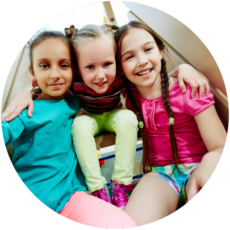
Cultivate Friendships this Summer
For children with or without disabilities, social friendships are important. Community and social interactions benefit our children in various ways and can enhance mental and emotional well-being. However, opportunities for social interaction may become more difficult during the summer months when kids are no longer in school. Create a social group where your child and other children can maximize their summer break.
Our kids deserve a positive social experience in their neighborhood. Organizing friend groups for our kids is one way to do that. To help parents create friend groups for their kids, here are some steps:
Step 1: Find Participants
Start by thinking about other kids in your neighborhood who might be interested in friend groups. Think about age, common interests, and compatibility. Getting in touch with your child’s current friends or classmates can also help.
Step 2: Organize a Meet and Greet
Once you have identified potential participants, organize a meet and greet event. This could be done in your backyard or a local community park. Encourage the children to interact with each other and engage in fun activities such as games or art projects.
Step 3: Foster Common Interests
Help the children discover common interests by organizing activities and events that cater to their interests. Consider organizing book reading clubs, nature hikes, sports clinics, or cooking classes. By focusing on shared interests, children are more likely to bond and form lasting friendships.
Step 4: Encourage Organized Activities
Encourage the children to participate in organized activities in the community such as library events and activities, community celebrations, local business tours (Home Depot child and youth workshops, and grocery store department tours (bakery, deli, etc) These activities provide structured opportunities for children to interact and work together, helping them develop social skills and enhancing their friendships.
Step 5: Maintain Communication
Regularly communicate with the children involved in the friend group. This can be done through text messages, email, or a group chat platform. Encourage open communication and provide opportunities for them to share their thoughts, concerns, and ideas for activities.
Step 6: Support and Encouragement
Provide support and encouragement to the children as they navigate the ups and downs of friendships. Encourage empathy, kindness, and respect among group members. Offer guidance when needed, but allow children to resolve conflicts on their own whenever possible.
Step 7: Celebrate Achievements
Celebrate milestones and achievements within the friend group. This could include organizing informal parties or recognition ceremonies. By acknowledging the growth and success of each child, you can strengthen the bond within the friend group.
Step 8: Continuously Evaluate and Adapt
As the group evolves, it is important to continually evaluate and adapt the friend group structure. Consider whether any changes need to be made based on the interests of the children, their changing needs, or if there are any challenges within the group.
By following these steps, parents can help facilitate the creation of friend groups for their children in their neighborhood. Remember, forming and maintaining friendships is an important developmental milestone in a child’s life, and fostering a supportive and inclusive environment can help them thrive socially.
Click on these additional resources to find out how to create social opportunities this summer for your children and youth.
Skill-Sharing Workshops:
Skill-sharing workshops provide a platform for community members to teach and learn from each other. This includes language classes, cooking lessons, DIY projects, technology tutorials, or financial planning seminars.
https://www.skillshare.com/en/browse/kids
https://learningessentialsedu.com/cultivating-friendships-during-the-summer-break/
For Children:
https://disorganisedsundayschoolblog.com/how-to-start-a-preschool-playgroup
https://naomialdort.com/social-skills-are-learned-with-parents-first/
For Youth:
https://www.ashleyhudsontherapy.com/post/13-ways-on-how-to-help-your-teen-make-friends#viewer-7lg97






